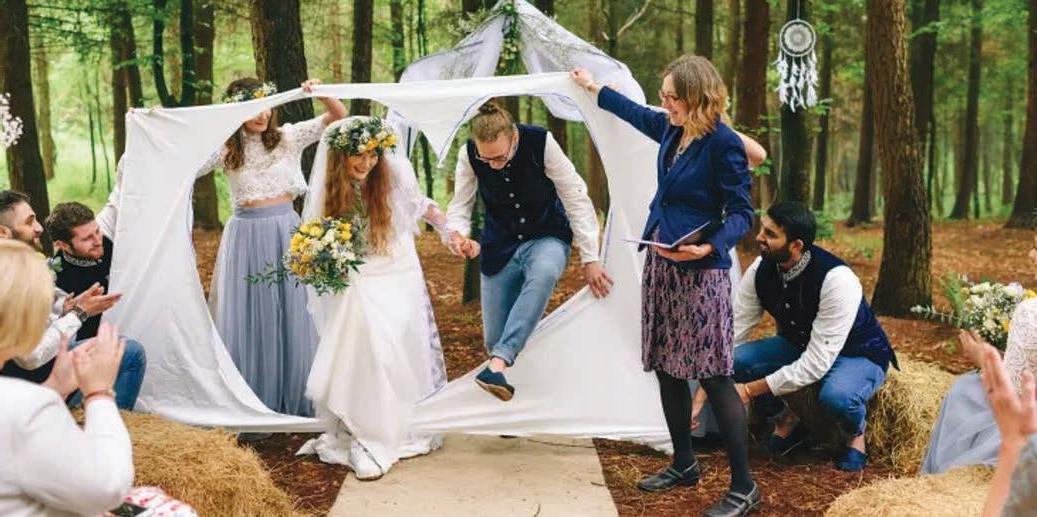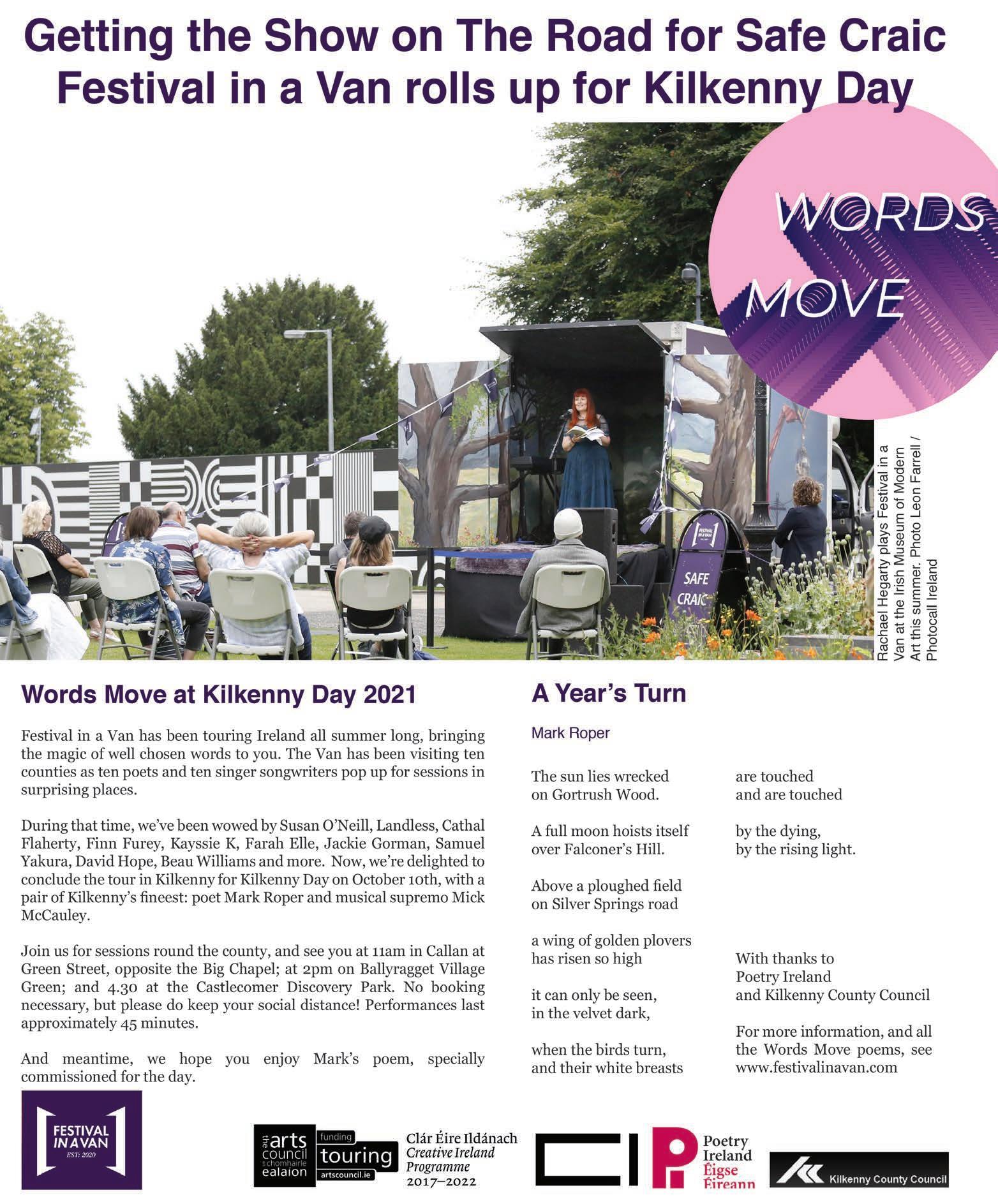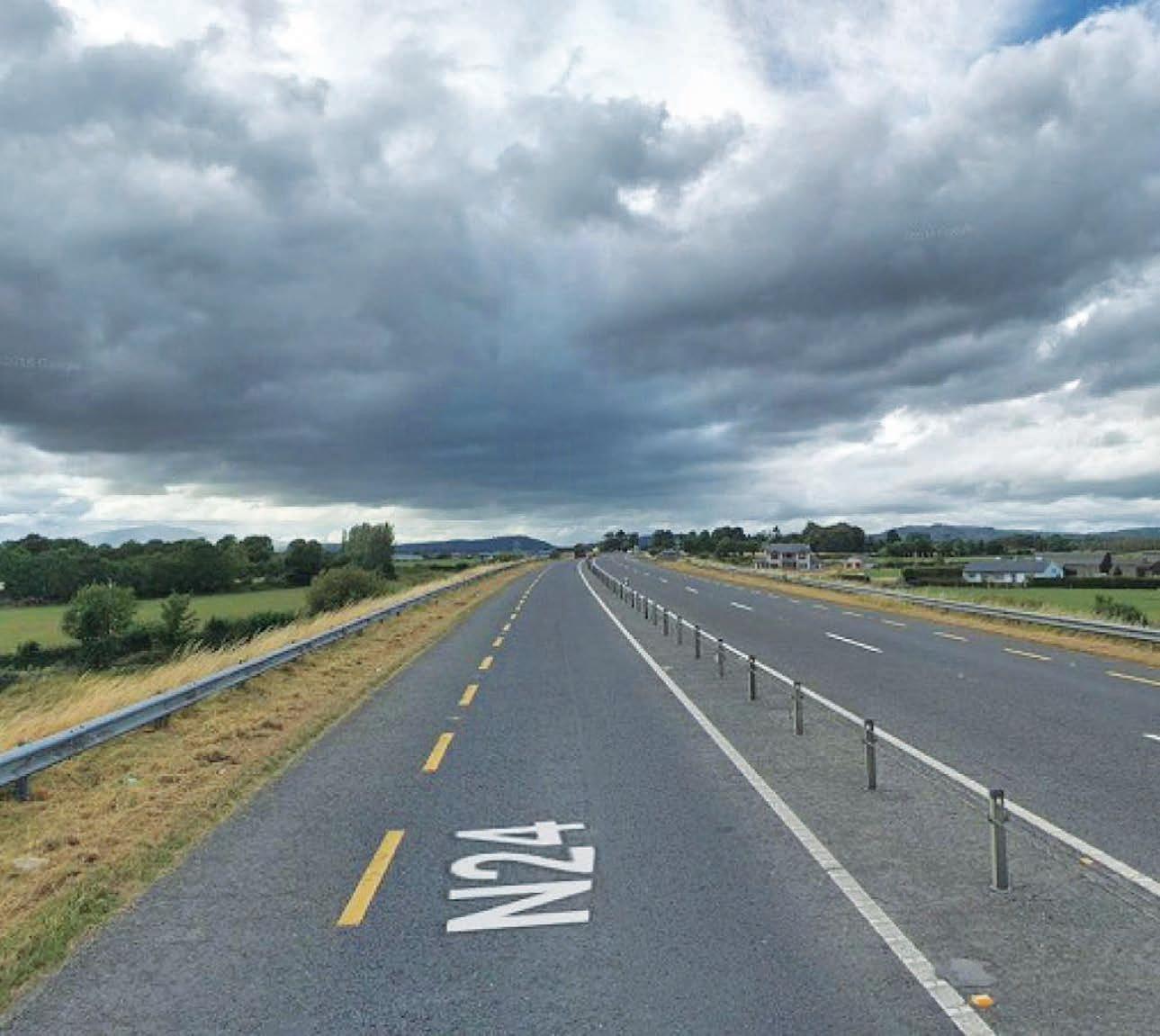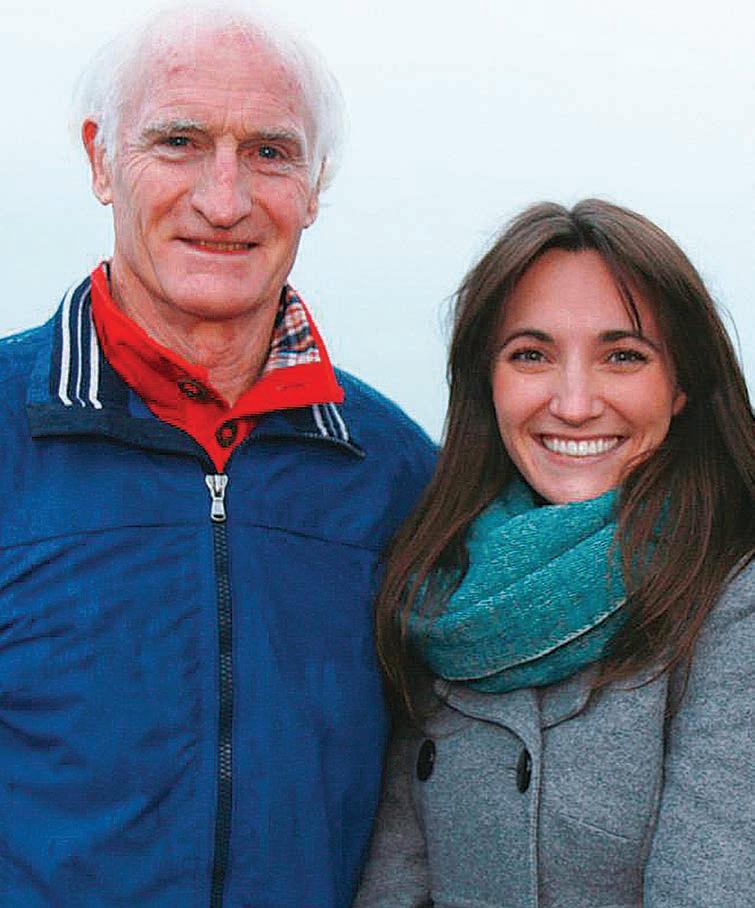
13 minute read
Marianne Heron
Don’t get me to the church on time ...
AS I SEE IT
Advertisement
MARIANNE HERON
THE sounds of a ceremony in progress drifted over the fuchsia hedge from next door with a woman’s voice addressing the gathering between intervals of music. is humanist celebration to name the neighbours’ one year old daughter took place on a summer day in a Connemara garden. is charming occasion for a gathering of friends and relations is part of a growing trend in non-religious events for weddings, namings and funerals.
Before the disruption of the pandemic the Humanist Society of Ireland (HAI) were conducting 3,000 ceremonies a year and according to their administrator, Tilda Taylor, the demand for humanist celebrants is growing as things return to normal.“Some of our celebrants are fully booked already for next year. We are increasing our numbers and have 10 celebrants in training at present and will have another 10 in training next year,” she says. e trend does prompt the question as to why are people moving away from the institutional churches to mark the major rites of passage in life? Perhaps it may be a sign of the way Irish society is becoming increasingly secular. In the 2016 census 78.3% of the population gave their religion as Catholic compared to 84.2 % in 2011 and with a sizeable drop from the peak in 1961 of 94.9 % of the population, while the 2016 gure for no religion was 9.8%.
Maybe for some the turning away has something to do with the many scandals that have emerged about the clergy and religious orders. e biggest demand for humanist ceremonies is for weddings something the HAI’s celebrants have been able to conduct since the introduction of the Civil Registration Act 2012 which allows accepted secular bodies to conduct weddings. Couples may choose to have a secular celebration because it allows them more freedom to choose the style of ceremony they would like to have, says Tilda Taylor.
Non-religious celebrations allow couples to have the wedding and the reception in the same place, or in a garden or by the sea if they wish so there is more autonomy in their choice without regulation by the church.
ere are no laws about who may conduct other types of ceremonies, like renewal of vows or memorials. Requests for secular funerals are less frequent and are most likely come from people who don’ t belong to an institutional church although the trend is growing.
When it comes to funerals there are perhaps two camps, people who talk about how they would like the ceremony to be and those who avoid the subject altogether. My late husband David belonged to the second group, the one thing he did make clear during his last illness was that he didn’t want a traditional church service. Neither of us belonged to an institutional church, whatever our ideas about faith and to go to a church seemed out of keeping with our views.
I had previously attended a humanist funeral at Mount Jerome deconsecrated chapel for a cousin which seemed a digni ed way to mark his rite of passage. I was given the name of a humanist celebrant and it was reassuring to have someone as empathetic as Brian to walk me through the organisation of the ceremony, to smooth the path through unfamiliar territory and arrange the details of the service.
Somehow it mattered very much to get the occasion right both for the husband whose life I was celebrating and for the many people who came to remember him. Close ends gave wonderful eulogies, a very dear friend and his daughter performed part my husband’s favourite piece of music. e most challenging thing at such a time for the celebrant to strike the right note and Brian did so admirably, sincerely and with dignity. It was a great comfort and it was good to have a choice about the ceremony.




A NUMBER of road improvements, as well as the alreadyannounced regeneration of Waterford’s city centre, are among the projects in the southeast mentioned in the National Development Plan.
More than €27 million has been given as the cost for the Waterford regeneration, which was approved last March, while a number of road improvement schemes have also been given the green light. e N24 between Waterford and Limerick, which runs through Carrick-on-Suir, Clonmel, Cahir, Tipperary Town, Pallas Green, and several other towns and villages, has long been a source of grief in the areas involved.
It was selected for ‘pre-appraisal and early planning’ in 2018, particularly the sections from Waterford to Cahir and Cahir to Limerick Junction. e proposed plan has the N24 improvement as ‘subject to further approvals’ as well as the N25 enhancement of the road between Waterford city and Glenmore in south Kilkenny, and the N11/N25 between Oylegate and Rosslare in Co Wexford. ere were also plans in the 2018 blueprint for a urles Relief Road and a Carlow Southern Relief Road and these are again namechecked in the latest plan.
Projects which were successfully completed in recent years having been part of previous plans, include the completion of the M11 section between Gorey and Enniscorthy, as well as the New Ross Bypass, including the new Rose Fitzgerald Kennedy Bridge over the river Barrow.
Also mentioned was the Dunmore Wing at University Hospital, and the Waterford Greenway, which was developed between 2014 and 2017 at a cost of €21 million. e long-awaited development of the North Quays in Waterford city was provided for in the 2018 plan, with funding since allocated to allow for strategic development zone designation and the infrastructure needed to proceed with a major business/ leisure/tourism/residential development on the site.
However, the plan hit a snag earlier this year when the council in Waterford lost patience with the private development company involved in the regeneration project, because of contract delays, and it remains long-awaited.
A new rail station, seen as part of the overall necessary infrastructure for regeneration, is part of today’s plan, as are bus corridors in Waterford city, the BusConnects scheme and a “sustainable transport bridge”, which would link the north and south quays.
Other projects referred to in today’s plan include a new water supply scheme for Clonmel in south Tipperary, as well as the Trinity Wharf development in Wexford town, which recently received planning permission and is described as “a new sustainable urban quarter” including of ce space, hotel accommodation, residential and leisure/ cultural development.
Meanwhile, the Technological University for the South East (TUSE), which is now due to formally come into being at the start of 2022, is again referred to by the Government.
In 2018, ‘new buildings’ in Carlow and Waterford to facilitate a merger of their institutes of technology, and a ‘site in Wexford’ to facilitate an outreach campus as part of the southeast university, were all promised.
e development plan says that “work is progressing to identify campus development needs” for TUSE, “including an expanded campus footprint in Waterford and a new campus in Wexford”. e Taoiseach said as late as last week that the formation of the TUSE is still on track for January.
SPECIAL REPORT What the NDP means for the South East
Project Ireland 2040 will commit to expenditure on capital projects totalling more than €165 b. How Kilkenny, Waterford and Wexford will fare in the deal

€35b. to spend on how we will travel
THE Government said its €35 billion investment in the transport system will transform how the country travels and halve Ireland’s greenhouse gas emissions by 2030.
Public transport will get €12 billion in funding, with road projects receiving €6 billion and walking and cycling routes receiving €4 billion.
While the MetroLink and DART+ are included in the plan, there are no completion dates, stating that they will be “progressed to construction”. e investment, as part of the Government’s revised National Development Plan (NDP), will see an additional 500,000 walking, cycling and public transport journeys delivered by the end of the decade.
e Government has pledged that the plan will add some 1,000km of new walking and cycling infrastructure in the next four years. e NDP will see BusConnects rolled out in Dublin, Cork, Galway, Limerick and Waterford, while around €350 million will be spent on renewing and expanding rural and regional buses. THE National Development Plan (NDP) commits to the development of housing and accommodation for a range of vulnerable individuals and families under the Capital Assistance Scheme. is includes the development of age-friendly housing for individuals with a disability and accommodation for homeless households. e NDP says the provision of suitable housing in the community (in conjunction with the Department of Housing, Planning and Local Government) will be progressed.
It notes that the Disability capital programme includes decongregation from longterm residential care units for people with disabilities and additional communitybased supported housing arising from the Disability Capacity Review.
e Disability Capacity Review was published by the Department of Health in July.
According to the Disability Capacity Review, a minimum €350 million additional revenue funding would be required in 2022 in order to meet the lower end estimates.
And €500-€800 million in capital spend would be required over the period to 2032.
Housing a priority for the vunerable
Time to bin the old smartphone
KILKENNY families are being challenged to nd and recycle ve end-of-life electrical items in a bid to improve our recycling performance after consumption increased dramatically in the last year. e country’s largest e-waste recycling scheme, WEEE Ireland, is urging Kilkenny residents to become e-detectives for the month of October and follow electrical leads around their homes to identify devices that are beyond repair.
EU data shows old smartphones are the most unused and hoarded electrical items lying around Irish homes. e ‘Follow Your Lead’ campaign aims to increase the supply of waste electrical recycling to local authority sites and retailer collection points to meet Ireland’s rising recycling targets.
A surge in lockdown spring cleaning saw 938 tonnes of electrical waste collected in Kilkenny by the country’s largest recycling scheme in 2020, despite Covid-19 and travel restrictions.
Some 9.5kg of e-waste was recycled for each person in Co. Kilkenny last year – exceeding the 2019 collection rate of 8.6kg, but falling short of the 2020 national average of 10.9kg a person.
To continue this momentum, WEEE Ireland are urging families to utilise the free recycling facilities available in the Dunmore Recycling & Waste Disposal Centre.
Irish homes contain an average of 15 to 20 electrical items which are broken or unused, according to WEEE Ireland.
And new EU data indicates that each person is responsible for an average of 5kg of hoarded electrical waste – meaning 15-20kg of old and broken appliances are waiting to be recycled from most households.
“When you add it up, 5kg equates to a kettle, a laptop that won’t power up, a smartphone beyond repair, an unplayable small gaming device and that kitchen blender in the back of the cupboard that hasn’t worked for years,” said WEEE Ireland CEO Leo Donovan.

Duncan will show us the green way

IRISH environmentalist Duncan Stewart, wellknown as the host of RTÉ’s Eco Eye since 2002, is to offer his expertise and guidance to businesses across Kilkenny.
Exclusively available to businesses in the South East, enterprises are invited to attend the free Green for Micro conference on Friday, October 15 at 9.30 am, hosted online via Zoom. To register visit: www.localenterprise.ie/ Kilkenny The Green for Micro conference offers a unique opportunity to learn how to cut harmful emissions and make significant energy and bottom-line savings.
It aims to support small businesses in the South East and break down environmental and sustainability challenges for their business.
Keynote speaker Duncan Stewart will share his insights on how vital it is for businesses to address environmental issues within their business and how this will ensure the sustainability of small enterprises into the future.
Expert speakers from 3 Counties Energy Agency (3cea) and the Southern Region Waste Management office will share useful tips on how to make simple changes. For example, how to manage waste in your business and how to access funding support for greener practises.
The panel of speakers will demonstrate how investing time and resources in green issues will ultimately benefit small businesses.

Eye on eco: Duncan Stewart and Lara Dungan

It’s Darcy days out for all of our little girls ...
MADE in Ireland and with the highest quality of materials and craftsmanship, luxury childrenswear label Darcybow is preparing to welcome parents and children to their upcoming ‘Darcy Days Out’ which enable parents to see, feel and choose a stunning out t for their little one for a special occasion.
Designed for alll our little girls aged three to 10 years, these classic dresses and out ts are hand stitched in Ireland and designed to be passed on from generation to generation, with quality and sustainability in mind.
With two striking collections to choose from (see below for details) , Darcybow’s designs range from classic white dresses for communions and ower girl duties, to Victorian style dresses in teals, navy and ruby shades.
Darcybow will be showcasing their collection at Butler House, Kilkenny on Saturday and Sunday, October 9 and 10.
Designed and conceived by businesswoman Triona Spellman, this luxurious classic collection of children’s dresses, coats and accessories is inspired by Victorian classic clothes for children with rich colours and durable, comfortable fabrics throughout.
Deep blues, teals and ruby reds on capes and dresses will no doubt be showstoppers this autumn at days out, birthday parties and festive gatherings.
Oversized bows, statement collars and pops of colour make these pieces designed to last and be passed down from generation to generation.
Prices start at €120 for a dress and €160 for a cape, all which are designed exclusively in Ireland.
Councillor hits out over lack of water upgrade
A KILKENNY councillor has hit out at Irish Water for not including CloghMoneenroe in its upgrade plans.
Cllr John Brennan said the local water treatment plant was at capacity and, without an upgrade, any housing project earmarked for the area woould not be able to happen.
Bennettsbridge and Ballinabranna were both approved for works y among 21 projects under the Small Towns and Villages Growth Programme.
However, Cllr Brennan said he received a letter from Irish Water to say it had no future upgrade plans for the plant in Clogh- Moneenroe despite several calls for works to increase capacity for the local area.
He told KCLR news he was not prepared to accept it.
“I have arranged a meeting with officials of Irish Water and I know Councillor Pat Fitzpatrick is going to join me in that meeting. We’re calling on Irish Water to make the necessary funding available immediately for the upgrade of the treatment plant,” he said.
See also Page 22
Carol Knox eliminated
KILKENNY participant Carol Knox has been eliminated from Glow Up Ireland. Judges Cathyanne Mac Allister and Emma O’ Byrne decided it was her time to leave after making it through to the top six make-up artists in Ireland.
Her Glow Up Ireland journey ended, but she was also grateful to be able to return home to her two children, who she was really starting to miss.










